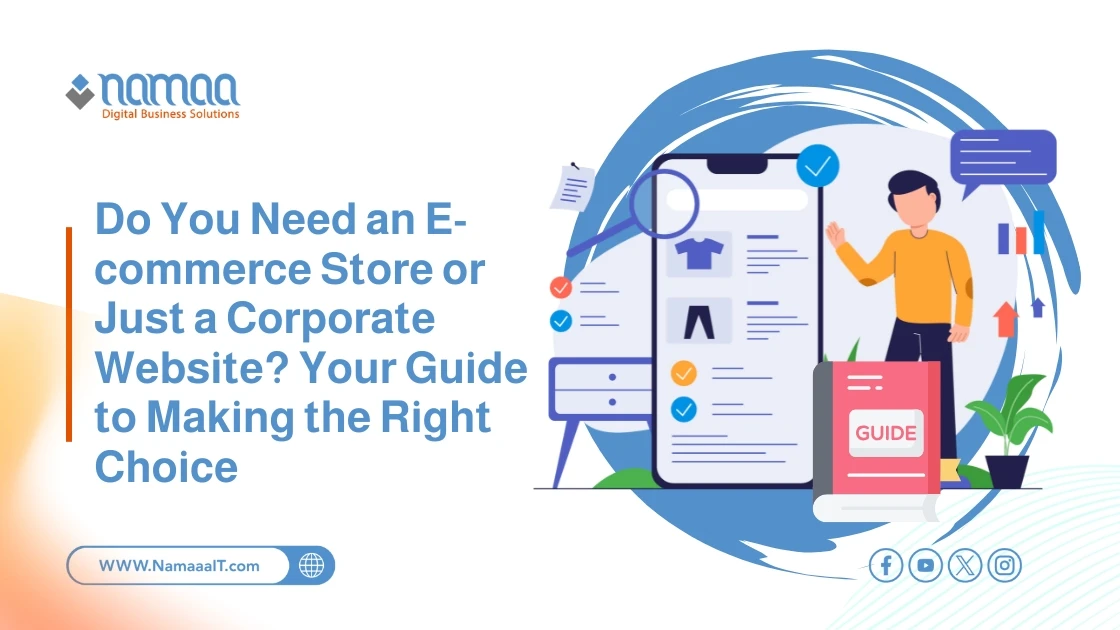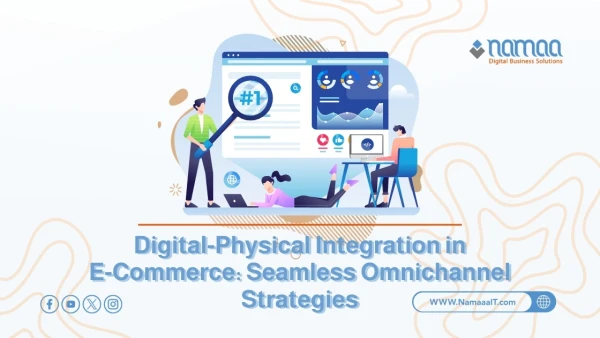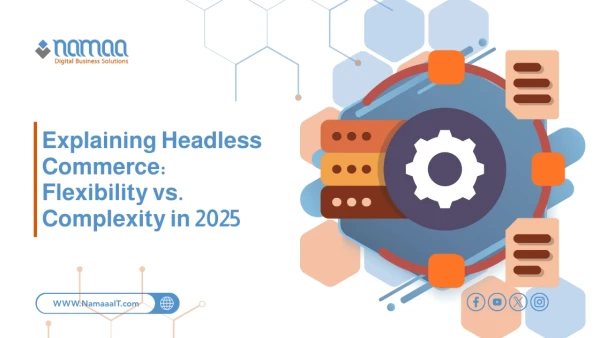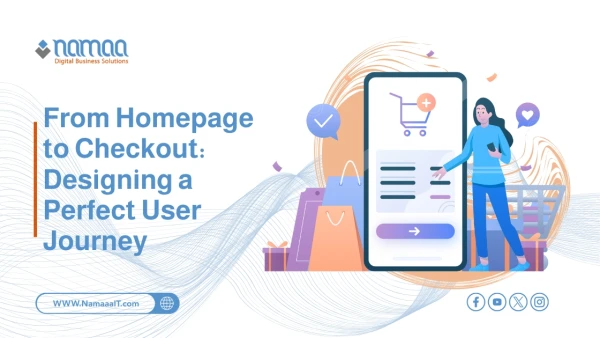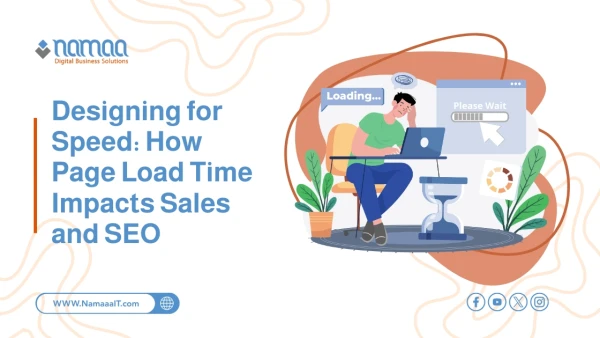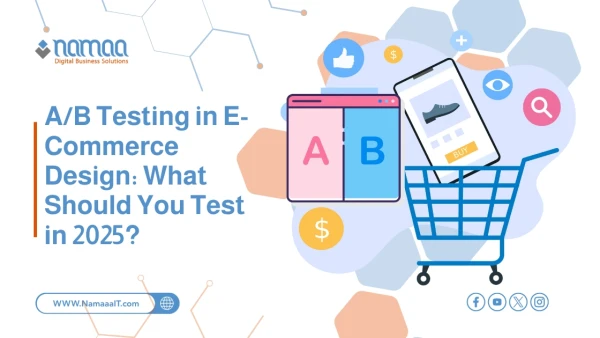Having an Online Presence: Corporate Website or E-Commerce Store?
Establishing an online presence is no longer optional—it’s an absolute necessity for any business or personal project aiming to grow and expand. But a key question arises when considering this presence: Is it better to create a fully functional e-commerce store, or is a simple corporate (informational) website enough? This decision isn’t merely technical; it’s a strategic choice that defines how you interact with your audience and achieve your goals.
This comprehensive guide is designed to equip you with essential information and the fundamental differences between the two options, helping you make the right decision for your needs and ambitions.
What is a Corporate Website and Why Is It Important?
A corporate website—also known as a business website or a portfolio website for professionals—acts as your digital business card or your media interface online. Its main purpose is to present clear and concise information about you, your company, your services, and achievements (without directly selling products or services on the site).
Main objectives of a corporate website:
- Build credibility and trust: It gives a professional impression and demonstrates seriousness.
- Showcase experience and achievements: Through pages like About Us, Our Services, and Portfolio.
- Facilitate communication: Provides contact information (phone, email, contact form, address).
- Lead generation: Through contact forms or calls to action like "Request a Quote".
- Share valuable content: Via a blog that reinforces your authority and expertise.
Who should consider a corporate website?
- Service providers (lawyers, accountants, consultants, coaches).
- Small and medium-sized businesses that do not sell products directly online.
- Freelancers and creatives (designers, writers, artists) to showcase their work.
- Nonprofit organizations and government agencies.
- Any entity seeking a professional digital presence without complex sales operations.
What is an E-Commerce Store?
An e-commerce store is a digital platform specifically designed for selling products or services directly to customers online. It includes advanced functions such as product listings with details and prices, shopping carts, multiple payment options, and shipping/inventory management systems.
Main objectives of an e-commerce store:
- Increase sales and profits: By reaching a geographically wider customer base.
- Expand operations: Beyond the physical store limitations.
- Provide a seamless shopping experience: 24/7 and from any location.
- Collect customer data: To analyze behavior and enhance marketing efforts.
- Automate sales processes: Minimizing human involvement in every transaction.
Who should consider an e-commerce store?
- Retailers selling physical products (clothing, electronics, books, etc.).
- Digital product sellers (software, ebooks, online courses).
- Service providers offering bookable and payable services (e.g., paid consultation appointments).
- Companies transitioning from traditional sales to online commerce.
Corporate Website vs. E-Commerce Store: Key Differences
| Feature | Corporate Website | E-Commerce Store |
|---|---|---|
| Primary Goal | Build brand awareness and trust | Direct sales and revenue generation |
| Core Functions | Information display, contact forms, blog, portfolio | Product listings, cart, payment gateways, order/inventory management |
| Content Focus | Services, expertise, company info, case studies, testimonials | Products (images, descriptions, pricing), promotions, reviews |
| Call to Action (CTA) | “Contact Us,” “Request a Quote,” “Learn More” | “Add to Cart,” “Buy Now,” “View Deals” |
| Technical Complexity | Relatively simple | More complex (requires payment, inventory, security integration) |
| Initial Cost | Generally lower | Generally higher (due to features and licensing) |
| Ongoing Maintenance | Lower (content and basic updates) | Higher (inventory, customer support, security) |
| SEO Strategy | Focus on service- and info-based keywords, local SEO | Focus on product-related and transactional keywords, advanced technical SEO |
When to Choose a Corporate Website
Choose a corporate website if:
- You offer professional services: Law, consulting, design, writing, coaching. Your goal is to build trust and showcase your expertise to attract potential clients.
- Your products are complex and require explanation: Such as industrial solutions or B2B software. A corporate site allows you to demonstrate value and present case studies.
- You’re building a personal brand: As an artist, writer, or speaker—your site becomes your online resume and portfolio.
- You’re on a limited budget: A corporate website is cheaper to build and maintain than a full e-commerce store.
- You don’t want to handle online sales logistics: Like managing payments, shipping, or stock.
- You’re focused on informing and supporting existing clients: Like a knowledge center or support portal.
When an E-Commerce Store is Your Best Option
Go for an e-commerce store if:
- You sell physical or digital products directly: Clothes, accessories, books, software, recorded courses.
- You want to reach a broader audience and scale sales: Break geographic barriers with online sales.
- You aim to automate the sales journey: From product browsing to payment and delivery.
- You have stock ready to ship or deliver digitally.
- Your competitors are successfully selling online: You need to keep up to remain competitive.
- You want to collect customer data: E-commerce platforms offer valuable analytics.
- You want to boost revenue through digital channels.
read more: Top 10 Features Your Company Website Must Have
Can You Combine Both? Hybrid Model & WooCommerce Solutions
Yes! You don’t always have to choose just one. The hybrid model combines the best of both worlds:
- Corporate Website with simple selling features: You can build a strong informational website with added e-commerce features for limited products (e.g., your books, courses, or service-related merchandise). Platforms like WordPress with WooCommerce make this easy.
- E-Commerce Store with rich informational content: Your online store can include About Us, Blog, and Case Studies pages to build trust and provide added value. Platforms like Shopify and PolarisMAX allow this integration easily.
- When to consider a hybrid model:
- Your core offering is services, but you also sell related products.
- You want to test the e-commerce waters with a limited product line.
- You aim to build a community around your brand through content while offering the option to buy.
SEO Considerations for Each Type
Regardless of your choice, SEO is essential to help your audience find you.
SEO for Corporate Websites:
- Keywords: Focus on service-related (e.g., “best web design company in Riyadh”) and informational keywords (e.g., “how to choose a digital marketing agency”).
- Content: Create detailed service pages, case studies, and high-quality blog articles answering user questions.
- Local SEO: If you serve a specific area, optimize your Google My Business listing and use local keywords.
- Link Building: Earn backlinks from reputable sites in your industry.
- UX: Ensure a mobile-friendly, fast-loading, easy-to-navigate site.
SEO for E-Commerce Stores:
- Keywords: Focus on product-specific keywords (e.g., “buy iPhone 14 Pro”) with high buying intent.
- Site Structure: Organize categories and products logically for easy navigation.
- Product Pages: Use unique, detailed product descriptions, quality images, customer reviews, and structured data (schema markup).
- Category Pages: Provide unique, descriptive content for each product category.
- Technical SEO: Ensure fast loading, mobile responsiveness, SSL certificates, XML sitemaps, and proper handling of out-of-stock products.
- Avoid Duplicate Content: Especially on product descriptions.
- Conversion Rate Optimization (CRO): Alongside SEO, enhance user experience to drive purchases.
How to Get Started After You Decide
Once you determine which option suits you best—corporate website, e-commerce store, or hybrid:
- Clearly define your goals: What exactly do you want your online presence to achieve?
- Choose the right platform:
- For corporate websites: WordPress, Squarespace, Wix.
- For e-commerce: Shopify, WooCommerce (with WordPress), BigCommerce, Magento, or PolarisMAX.
- For hybrids: WordPress with WooCommerce is a flexible, popular choice.
- Pick a domain name and reliable hosting.
- Plan your content and design: Focus on UX and brand identity.
- Invest in professional design or learn the basics yourself.
- Don’t ignore SEO from the start: Do keyword research and plan a search-engine-friendly site structure.
- For e-commerce: Set up payment gateways, shipping/return policies, and inventory management.
- Test thoroughly before launch.
- Create a marketing plan to promote your site/store.
Summary
✅ A corporate website is ideal for building credibility and showcasing services (84% of users see it as a trust signal), while an e-commerce store focuses on direct sales and higher revenues (e-commerce is growing by over 10% annually worldwide).
✅ Your choice depends on your business type (service or retail), your goals (awareness or sales), and your budget—e-commerce stores often cost 2–3x more.
✅ E-commerce stores require more complex features (payment, shipping, inventory) and 20–30% more annual maintenance costs.
✅ You can combine both using a hybrid model like adding WooCommerce to a corporate website—WooCommerce powers over 28% of online stores.
✅ SEO is crucial for both—60%+ of clicks go to the top 3 results—though with different strategies and keywords for each.

